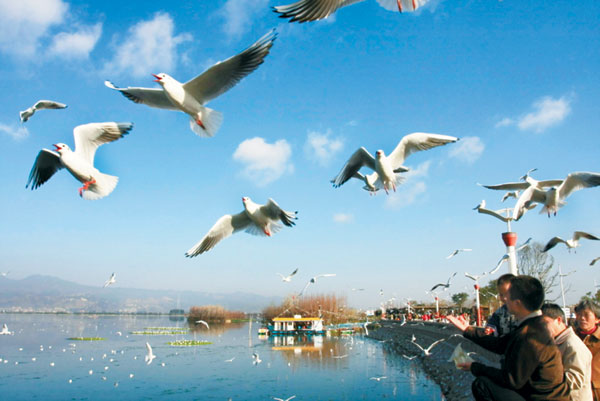|
|||||||||
There was a time when you threw a pebble into the lake and it would not sink. Dianchi Lake was so polluted it was choked up and dying. But now, the lake is starting to breathe again. Our Yunnan bureau's Li Yingqing and Guo Anfei track its resurrection.
It sits like a sparkling emerald on the Yunnan-Guizhou plateau in southwestern China, close to Kunming, the City of Eternal Spring, the capital of the province South of the Colored Clouds. The water is land-locked, but it is set within a land of milk and honey, where flowers bloom year-round and botanical diversity has attracted collectors from all over the world since the 19th century.
|
 |
|
Lake Dianchi sits right in the heart of Yunnan, and its shores fringe Kunming, the provincial capital. Provided to China Daily |
There is sunshine all year, and the high altitude of almost 2,000 meters above sea level means the lake is relentlessly exposed to bright sunshine. And that's where part of the problem lies.
The Dianchi we see now is the result of years of dedication and commitment to cleaning up and maintenance of wetland filters. The water is cleaner, the seagulls are back, and the fishermen are putting their lines in again.
But that was only a recent improvement after years of disasters.
In 2005, eutrophication of the lake was at its most serious. The bloom of phytoplanktons in the water was so dense that a stone thrown into the water took some time to sink. Its ecological balance was gone and nothing could survive, so depleted was the lake of oxygen. The water had turned a bright, thick putrid green.
It was not an overnight problem, but a slow assassination that began in the 1990s when commercial activity and residential development along the lake's banks spiked dramatically.
Pollution was caused by the indiscriminate dumping of sewage, garbage, and made worse by fertilizer flow-offs from vegetable and animal farms, and mining waste.
What was hailed as the "Pearl of the Plateau" became infamous as the most heavily polluted body of water in China. Dianchi had lost its luster.
Water in the lake was defined as "third-class water" before 1986, a classification that indicated it could be used as drinking water according to national standards.
By 1994, it had deteriorated so much it could only be classified as "fifth-class water", suitable only for agricultural use. By then, the water had turned severely turbid, with extremely high eutrophication - a condition induced by an artificial increase in nutrients in the water, which in turn causes excessive micro plant growth such as algae.
The water quality continued to worsen, until by 2000, it was so bad that it failed to meet even the lowest of the "fifth-class" standards for three consecutive years. Dianchi was a cesspool, unfit for any human or agricultural use.
It had become the shame of Yunnan, rather than the pride of the plateau, and labeled a huge problem that would take years of effort and a goldmine to restore.
It was not until 2008 that serious efforts began to contain the pollution, spurred by central government directives, including a statement by Premier Wen Jiabao at a symposium in 2007 that specifically pointed out that it was one of the worst environmental headaches facing the country.
In the long process, there were both successes and failures.
For example, an initial attempt to use water hyacinth to filter the water and trap pollutants hit a snag when the weeds went feral. The authorities now circumvents that by breeding the plants within enclosures and simply dragging the floating enclosures to where they were most needed.
In the same period, Yunnan also launched several initiatives to return farmland to forest, and to restore the wetlands.
The wetlands, especially, were crucial to help trap excessive artificial nutrients from escaping into the lake and inducing further eutrophication.
The creation and restoration of many wetland parks significantly improved the ecology of the region, and many native water fowls and migratory birds are back in numbers, including the red-legged Siberian seagulls that winter here every year.
In total, 33.3 square kilometers of wetland were created as part of the ecological rehabilitation programs. Sewage was intercepted with the construction of a network of pipes that channeled waste into treatment plants before treated water was allowed to flow into the lake.
New regulations were imposed to restrict the raising of livestock and poultry by Dianchi's banks, and vigilante groups and individuals patrol the lake as Yunnan citizens took active ownership of the project.
In China's 11th Five-Year Plan period (2005-2010), six projects were conducted to promote eco-dredging, minimize non-point source pollution, regulate and improve the courses of inward flowing rivers, and intercept sewage.
Another way Dianchi is to be protected from further pollution will be an attempt to refresh its waters by diverting water from surrounding rivers and tributaries.
Among the most important is the water diversion work from Niulan River, a tributary of the Jinsha, located about 130 km to the northeast of the lake. The 8 billion yuan ($1.28b) engineering feat will be finished this year and an estimated 600 million cubic meters of water is to be channeled into Dianchi each year.
"Nearly 115 km of water pipes are being built," says Qin Guangrong, the Communist Party chief of Yunnan province. "This will improve the overall quality of the lake to at least a category five."
The effort to restore water quality has been championed by many government heavyweights, including Qiu He, Yunnan's deputy party secretary, a keen crusader for ecological balance and the green issues.
Qiu has already announced that a "river system" that had effectively controlled pollution in Taihu Lake will also be implemented for Dianchi. Taihu, the Grand Lake, is China's third largest freshwater lake in the Yangtze Delta plain, on the border of the Jiangsu and Zhejiang provinces
Wang Lihua, the deputy director of the Dianchi Lake authority, notes that the solution was to "remove the pollutants from within the lake".
More than 17.1 billion yuan was allocated for cleaning up Dianchi Lake during the 11th Five-Year Plan. In the next five years, another 42 billion yuan will be spent to improve its water quality.
It's an expensive lesson that reminds China that its natural resources must not be sacrificed as it matures into a developed nation, and economic progress ripples across the country.
You may contact the writers at sundayed@chinadaily.com.cn.
Hot Topics
Wu Ying, iPad, Jeremy Lin, Valentine's Day, Real Name, Whitney Houston, Syria,Iranian issue, Sanyan tourism, Giving birth in Hong Kong, Cadmium spill, housing policy
Editor's Picks

|

|

|

|

|

|







